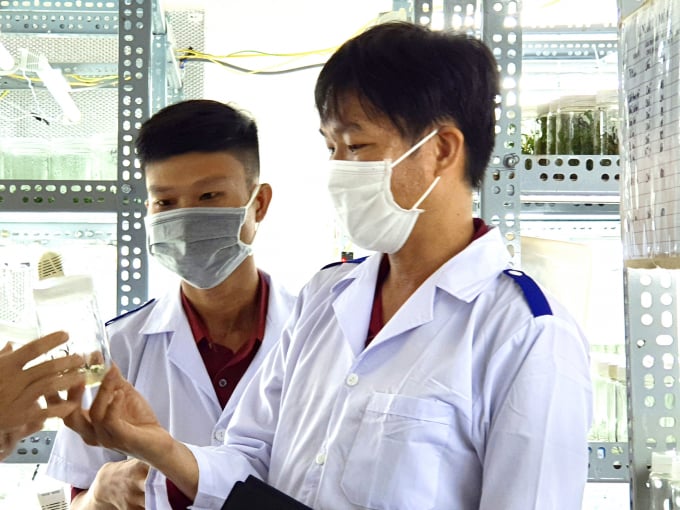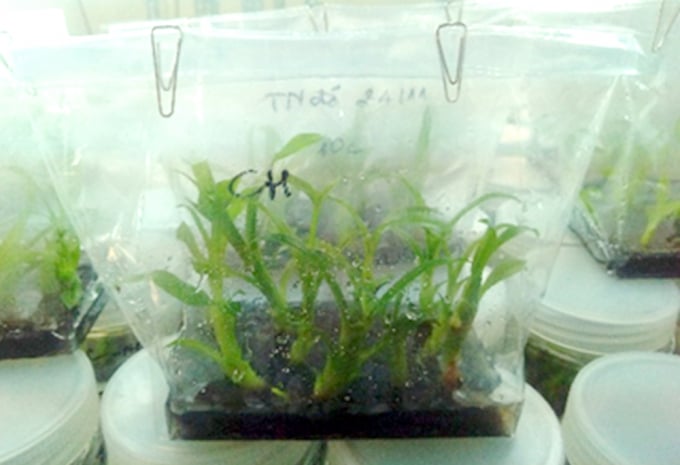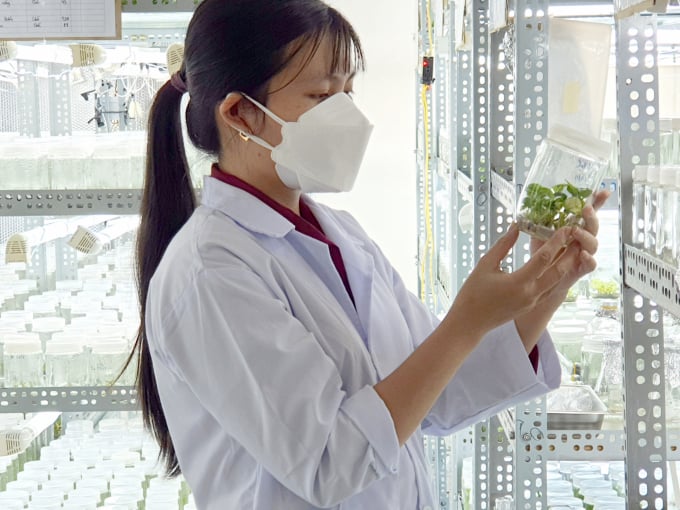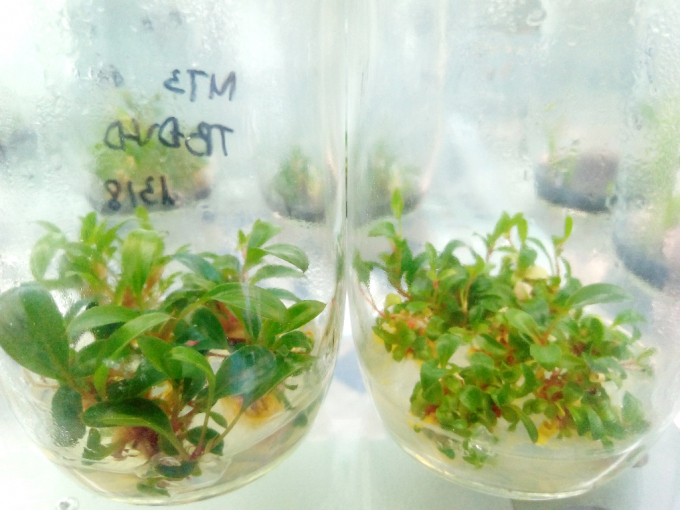November 26, 2025 | 13:49 GMT +7
November 26, 2025 | 13:49 GMT +7
Hotline: 0913.378.918
November 26, 2025 | 13:49 GMT +7
Hotline: 0913.378.918

Dr. Dang Minh Tam introduces tissue culture orchids at the Center for Biotechnology Application and High-Tech Agriculture (Mekong Delta Rice Institute). Photo: Ngoc Thang.
According to Dr. Dang Minh Tam, Deputy Director of the Center for Biotechnology Application and High-Tech Agriculture (Mekong Delta Rice Institute), in vitro propagation method is a synthesis of techniques used in tissue culture and under 100% sterile conditions.
It is a method of growing in a nutrient-rich environment to help plants grow best. The environment is an essential factor determining the success and quality of the tissue culture plants. The environment is responsible for supporting life, cell proliferation, directly affecting the results and production rate of tissue culture technology.
Plant tissue culture has become a viral propagation method for many crops such as industrial plants, agricultural plants, fruit and green vegetables, orchids, ornamental plants.
People in the Mekong Delta are ready to convert a large area of growing crops and fruit from traditional varieties into tissue transplants such as orchids, bananas, dragon fruits, sweet potatoes, etc.
Today, the demand for flowers and ornamental plants is increasing rapidly. The plant has lush green foliage, beautiful and elegant leaf shape, suitable for many purposes such as interior decoration, potted plants, or using cut branches for flower arrangements.

Growing tissue cultured orchids can produce a large number of individuals. Photo: Ngoc Thang.
In vitro propagation method is used to multiply plants, overcoming the disadvantages of other clonal methods such as extraction, grafting, or cuttings rapidly.
Dr. Dang Minh Tam said that tissue transplants could be propagated in large quantities to meet the needs of cultivation on a large scale. Seedlings with good characteristics are identical to the original parent plants. Tissue culture technology creates seedlings' inadequate nutritional conditions, helps plants mature quickly, and prevents harmful pests, especially viral diseases, ensuring disease-free seedlings.
Tissue transplants that have been screened and produced are plants with good characteristics, high uniformity, and ensure the same time of growth and harvest. Tissue culture is also used to create bio-pharmaceuticals, save the embryos of some difficult-to-grow plant species, and protect rare and endangered plant varieties.
There have been many new applications of tissue culture technology on the model of growing sweet potatoes, Japanese taro, potatoes, bananas, dragon fruit, fruit trees such as oranges, tangerines, and orchids ornamental plants.
In Japan, scientists Iwanami, Hidaka, and Omora (MUKHTAR) et al. (2005) cultured the apical shoots of citrus trees infected with CTLV virus (Citrus tatter leaf virus) on tissue culture medium supplemented with growth promoters (BAP, α NAA and GA3). The plant is almost free of the CTLV virus.

Nguồn giống cây nuôi cấy mô có thể mua ở các trung tâm nghiên cứu giống cây trồng. Ảnh: Ngọc Thắng.
In Vietnam, scientists have researched and built a system to regenerate citrus trees from ovules and anthers on local and imported citrus varieties... Model of tissue culture of betel nut is one of the species. The tree is trendy in the bonsai market.
In our country, the primary source of seed production is cuttings. However, this method gives a low multiplier, takes time and effort, and the seedlings are susceptible to diseases.
The supply of seedlings to the market is still inactive, unable to meet the rapidly increasing demand of the market. Therefore, it is necessary to find a new propagation method to produce a large number of seedlings in a short time.
The use of in vitro propagation culture method is one of the effective methods that can solve these difficulties.
At the Center for Biotechnology Application and High-Tech Agriculture (Mekong Delta Rice Institute), many shelves of tissue cultured orchids are being grown.
According to Dr. Dang Minh Tam, the most popular tissue cultured orchids today are phalaenopsis, etc. These are orchids with high economic value and beautiful flowers. Growing tissue cultured orchids has the advantage of producing a large number of individuals, quickly and with a very uniform number of individuals, free of diseases, creating orchids with selected genetic resources with the best characteristics from their parents.

Tissue cultured plant seeds can be purchased at plant breeding centers. Photo: Ngoc Thang.
Therefore, the source of tissue cultured orchids is extremely important, both to solve the problem of providing enough varieties and to bring about high economic efficiency. Farmers should learn and change this modern farming model to increasingly replicate the scale and economic efficiency in farming.
Center for Biotechnology Application and High-Tech Agriculture is one of the units under the Mekong Delta Rice Institute. The Center's tasks are researching, developing and applying biotechnology and high technology in agriculture for the Mekong Delta region.
The Center aims to be the leading unit in the region in research and application of science and technology to agricultural production; research, develop and provide services on application of biotechnology and hi-tech agriculture (seedlings, microbial products, substrates, technical processes, equipment, etc.) in agriculture production.
The Center also participates in activities in the selection, breeding and micropropagation of plants, ornamental plants, medicinal plants, forestry trees, fruit trees in the direction of high technology and application in agriculture. In addition, the Center also provides consulting, training, technology transfer and cooperation services in the field of biotechnology and high-tech application in agriculture.
Translated by Ha Phuc

(VAN) The model of making a living under the forest canopy through the agroforestry system in Van Son commune, Bac Ninh province, is expected to generate an annual income of approximately VND 30 million/ha.

(VAN) Many enterprises in Can Tho are harnessing natural energy and reducing greenhouse gas emissions in their production processes, thereby contributing to the promotion of a sustainable green transition.
/2025/11/24/3536-2-112800_176.jpg)
(VAN) Dong Nai now has tens of thousands of hectares of forests certified for sustainable management, and this area will continue to be expanded in the coming period.

(VAN) Vinh Ha hamlet (Dai Xuyen commune, Hanoi) is shifting away from small-scale farming as households adopt bioscurity into their breeder chicken models.

(VAN) Heavy rains make aquatic species more vulnerable to disease. Proactive water management and high-tech systems help farmers prevent outbreaks and protect yields.

(VAN) Greenhouses are shifting production mindsets in Binh Lu commune, enabling farmers to ‘weather the sun and rain’ and secure stable vegetable harvests throughout the year.

(VAN) Green transition is crucial for the Mekong Delta amid climate change and stricter standards, offering a path toward sustainability.